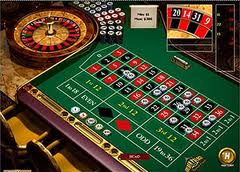 On a recent trip to Las Vegas, I noticed something in the casinos that I hadn’t seen before. Now, I should point out that I don’t spend a lot of time in Las Vegas; my wife and I go there maybe once a year. And while there, we do very little gambling, usually limiting our contributions to casino profitability to about $20 dropped into a slot machine in return for fifteen minutes of hope followed by an hour or so of disappointment. But we do spend time wandering through the casinos, people watching and enjoying the lights and sounds, until the accumulated effects of the dry, smoky air-conditioned atmosphere send us back outside in search of some fresh air. What struck me as peculiar on our most recent visit was the digital displays at the roulette wheels, showing the results of the last 50, 300 or 500 spins of the wheel–indicating which numbers had come up most frequently.
On a recent trip to Las Vegas, I noticed something in the casinos that I hadn’t seen before. Now, I should point out that I don’t spend a lot of time in Las Vegas; my wife and I go there maybe once a year. And while there, we do very little gambling, usually limiting our contributions to casino profitability to about $20 dropped into a slot machine in return for fifteen minutes of hope followed by an hour or so of disappointment. But we do spend time wandering through the casinos, people watching and enjoying the lights and sounds, until the accumulated effects of the dry, smoky air-conditioned atmosphere send us back outside in search of some fresh air. What struck me as peculiar on our most recent visit was the digital displays at the roulette wheels, showing the results of the last 50, 300 or 500 spins of the wheel–indicating which numbers had come up most frequently.
What seemed so curious to me is that, if a roulette wheel is, in fact, a “fair” device, that is, not rigged in any way to provide an advantage to the house, why would anyone pay attention to the fact that the ball had dropped into slot number “11” eighteen times in the last three hundred spins, and was the third most frequently hit number in those 300 spins. In a fair game of roulette, the result of each spin is completely independent of the results of any previous spins of the wheel. Each spin is a random event, during which the chances are identical that the ball will drop onto any of the 38 numbers on the wheel [the numbers 1 to 36, plus “0” and “00”].
 In spite of the randomness of the roulette wheel, apparently many gamblers think that they can use the results of recent spins of the wheel to help them guess which number will come up next. It’s not clear to me whether they think that certain numbers are “hot” numbers, and since they have come up frequently on recent spins that there is a greater than 1 in 38 chance that these numbers will come up on the next spin; or, conversely, since the numbers have paid off on recent spins, the odds would favor some different numbers paying off on the next spin.
In spite of the randomness of the roulette wheel, apparently many gamblers think that they can use the results of recent spins of the wheel to help them guess which number will come up next. It’s not clear to me whether they think that certain numbers are “hot” numbers, and since they have come up frequently on recent spins that there is a greater than 1 in 38 chance that these numbers will come up on the next spin; or, conversely, since the numbers have paid off on recent spins, the odds would favor some different numbers paying off on the next spin.
Don’t they realize that each spin of the wheel, like each flip of a coin, is a completely independent event? If you’ve flipped a coin and it has landed on “heads” ten times in a row, the odds that on the next flip of the coin it will land on “tails”, is still 50%, just like it was for the previous ten flips, and just like it will be for each flip in the future. Sure, you can get funny, non-random appearing patterns of results; but in the long run it is foolish to bet against the odds.
There’s another side to this story that bothers me, though–a sort of flip side of the roulette players mistake. Because it isn’t simply the statistically unsophisticated roulette player that mistakenly relies on the seemingly straightforward Yellow-Brick-Road marked out by “data” to show her the path to success. It happens all too frequently in the business world, where managers and executives pore over historical data, laid out in beautiful, organized arrays, seeming to structure the world into predictable patterns. They are seduced into thinking that thorough analysis of historical data might allow them to unerringly predict the future. They fail to consider how much of life is simply random, unplanned, and unpredictable. They go on their merry way, certain of success, since they are guided by data,–forgetting that they are really doing nothing more than making a bet on future events–and all too often their projects crash and burn, derailed because of some “random” event. Like the roulette player, data couldn’t protect them from the effects of randomness.
Apparently, my old friend, Fred Monti, had it right when he said, “The one thing that you always know is that you never know.”

And that’s why we don’t try to predict the stock market. Or, base our value to our clients as being able to predict it.
Amen to that! But beyond simply trying to predict where the stock market is going, the whole idea that collection and analysis of data can lead to otherwise smart people ignoring randomness effects…..That’s really scary.
Amen….great piece…..look forward to your writing…
Thanks Aunt Shirley. It’s nice to know somebody is reading my little labors of love.